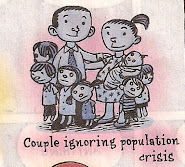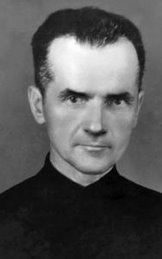Annunciation Catholic Church in Houston, Texas. The scaffolding covers the steeple, which is undergoing some needed repairs.
I Wandered Lonely as a Cloud, by William Wordsworth
I WANDERED lonely as a cloud
That floats on high o'er vales and hills,
When all at once I saw a crowd,
A host, of golden daffodils;
Beside the lake, beneath the trees,
Fluttering and dancing in the breeze.
Continuous as the stars that shine
And twinkle on the milky way,
They stretched in never-ending line
Along the margin of a bay: 10
Ten thousand saw I at a glance,
Tossing their heads in sprightly dance.
The waves beside them danced; but they
Out-did the sparkling waves in glee:
A poet could not but be gay,
In such a jocund company:
I gazed--and gazed--but little thought
What wealth the show to me had brought:
For oft, when on my couch I lie
In vacant or in pensive mood, 20
They flash upon that inward eye
Which is the bliss of solitude;
And then my heart with pleasure fills,
And dances with the daffodils.
1804.
It is Summer time in Texas. Well, let me qualify that. For most Texans, Summer starts when school ends. But for us Homeschool types, school never ends. I actually think that doing school throughout the Summer, sitting in the air conditioning is a good thing for our children. Let them go out in the morning or the evening, when the temperatures are milder.
The poem above is one of those things which one of the Noisykids has to analyze today. I figured that I could review it on the blog, since I had to read the poem, read my son's analysis of it, and then critique his writing. It is all good, since the way to become a writer is to write, and to review other people's writing. It goes along with this quote, which really struck me:
"Fifteen years from now, after you have mastered your craft, you will yearn to return to the things that most fascinated you when you were undergraduates."
- Anonymous Law School Professor
Yep. Carolyn has never asked me to whisper medical facts in her ear when she is feeling romantic. Seriously, though, I really enjoyed the few literature classes I took, and consider reading and writing to be a great avocation.
First, let us look at the anatomy of the poem:
1. Twenty-four lines, broken into four stanzas.
2. Each line consists of 8 syllables. There are a couple of lines where there are actually 9 syllables, but one could slur the words to make it more like 8 syllables. Look at lines 6 and 7. If one skipped the second syllable in 'fluttering' and pronounced it 'flut-RING,' or pronounced 'continuous' as 'contin-yoose,' the 8-syllable rule is observed.
Fluttering and dancing in the breeze.
Continuous as the stars that shine
I have a thing for syllables, because I like writing Haiku poems, and there one has to watch that the syllables don't go over the limit.
3. The rhyme pattern is A-B-A-B-C-C, where the first line of each stanza rhymes with the third, and the second and fourth rhyme with each other. The final two lines in each stanza form a separate couplet. There are no rhymes which connect any of the stanzas.
4. The only symmetry in the poem is that the poet starts out by looking at the daffodils, and ends up recalling the pleasure that came with seeing the flowers.
So, What does the poem say?
In the first stanza, the poet discovers a field full of daffodils. The title and first line of the poem imply that the writer was sad and feeling very lonely when he encountered the flowers. In the next two stanzas, he describes the flowers as numerous as the stars in the sky, and as dancers on the shore of the lake. He ends the third stanza by commenting that he did not appreciate just how much gladness came from seeing the daffodils. In the fourth stanza, he writes how his memory of the daffodils fills his heart with joy and consolation when he is sad.
By the way, for those of you who wondered, jocund means cheerful, merry, glad. Try to use it in a sentence today.
What does this poem mean to me?
This poem reflects my own experience, which automatically makes it a good poem. All of us have past experiences which we recall with joy. In Wordsworth's poem, he saw a field of daffodils alongside a lake. For me, there are many memories which can bring back such happiness that they may brighten any difficult or sad time. All of us have pleasant memories which can bring a smile to our face, even those which seemed trivial at the time. William Wordsworth has shared this thought with us in just a few lines of simple poetry.




















No comments:
Post a Comment